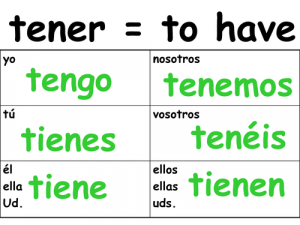Difference between revisions of "Language/Spanish/Grammar/Tener"
Jump to navigation
Jump to search
| Line 6: | Line 6: | ||
=== Present Tense - Presente de Indicativo === | === Present Tense - Presente de Indicativo === | ||
tú tienes - you have (informal) | * yo tengo - I have | ||
* tú tienes - you have (informal) | |||
él/ella/usted tiene - he/she/you (formal) have | * él/ella/usted tiene - he/she/you (formal) have | ||
* nosotros/nosotras tenemos - we have | |||
nosotros/nosotras tenemos - we have | * vosotros/vosotras tenéis - you all have (informal) | ||
* ellos/ellas/ustedes tienen - they/you all (formal) have | |||
vosotros/vosotras tenéis - you all have (informal) | |||
ellos/ellas/ustedes tienen - they/you all (formal) have | |||
=== Past Tense === | === Past Tense === | ||
==== a) Preterite Tense - Pretérito Perfecto Simple ==== | ==== a) Preterite Tense - Pretérito Perfecto Simple ==== | ||
ellos/ellas/ustedes tuvieron - they/you all (formal) had | * yo tuve - I had | ||
* tú tuviste - you had (informal) | |||
* él/ella/usted tuvo - he/she/you (formal) had | |||
* nosotros/nosotras tuvimos - we had | |||
* vosotros/vosotras tuvisteis - you all had (informal) | |||
* ellos/ellas/ustedes tuvieron - they/you all (formal) had | |||
==== b) Imperfect Tense - Pretérito Imperfecto ==== | ==== b) Imperfect Tense - Pretérito Imperfecto ==== | ||
ellos/ellas/ustedes tenían - they/you all (formal) used to have, had | * yo tenía - I used to have, I had | ||
* tú tenías - you used to have, you had (informal) | |||
* él/ella/usted tenía - he/she/you (formal) used to have, had | |||
* nosotros/nosotras teníamos - we used to have, we had | |||
* vosotros/vosotras teníais - you all used to have, you all had (informal) | |||
* ellos/ellas/ustedes tenían - they/you all (formal) used to have, had | |||
=== Future Tense - Futuro Simple === | === Future Tense - Futuro Simple === | ||
ellos/ellas/ustedes tendrán - they/you all (formal) will have | * yo tendré - I will have | ||
* tú tendrás - you will have (informal) | |||
* él/ella/usted tendrá - he/she/you (formal) will have | |||
* nosotros/nosotras tendremos - we will have | |||
* vosotros/vosotras tendréis - you all will have (informal) | |||
* ellos/ellas/ustedes tendrán - they/you all (formal) will have | |||
Revision as of 20:33, 4 May 2023
The use of the verb "Tener" (to have)
Conjugation
In Spanish, the verb "tener" means "to have." It is an irregular verb, which means its conjugation does not follow the standard patterns of regular verbs. Here is a breakdown of the conjugation of "tener" in the present, past (preterite and imperfect), and future tenses in the indicative mood.
Present Tense - Presente de Indicativo
- yo tengo - I have
- tú tienes - you have (informal)
- él/ella/usted tiene - he/she/you (formal) have
- nosotros/nosotras tenemos - we have
- vosotros/vosotras tenéis - you all have (informal)
- ellos/ellas/ustedes tienen - they/you all (formal) have
Past Tense
a) Preterite Tense - Pretérito Perfecto Simple
- yo tuve - I had
- tú tuviste - you had (informal)
- él/ella/usted tuvo - he/she/you (formal) had
- nosotros/nosotras tuvimos - we had
- vosotros/vosotras tuvisteis - you all had (informal)
- ellos/ellas/ustedes tuvieron - they/you all (formal) had
b) Imperfect Tense - Pretérito Imperfecto
- yo tenía - I used to have, I had
- tú tenías - you used to have, you had (informal)
- él/ella/usted tenía - he/she/you (formal) used to have, had
- nosotros/nosotras teníamos - we used to have, we had
- vosotros/vosotras teníais - you all used to have, you all had (informal)
- ellos/ellas/ustedes tenían - they/you all (formal) used to have, had
Future Tense - Futuro Simple
- yo tendré - I will have
- tú tendrás - you will have (informal)
- él/ella/usted tendrá - he/she/you (formal) will have
- nosotros/nosotras tendremos - we will have
- vosotros/vosotras tendréis - you all will have (informal)
- ellos/ellas/ustedes tendrán - they/you all (formal) will have
Remember that these conjugations are for the indicative mood. Spanish also has other moods, such as the subjunctive and imperative, which have their own conjugation patterns for "tener."
Use of the verb "Tener" in Spanish
Use of the verb "Tener" to express feelings or sensations
In English, we use TO BE + ADJECTIVE:
- Tengo hambre
I'm hungry
It's less common to say:
Estoy hambriento(like in English).
In Spanish we use TENER + NAME:
- Tengo frío
I'm cold
- Tengo sueño
I'm sleepy
Use of the verb "Tener" to say your age
- In English, they use "to be": I'm 22 (years old).
- In Spanish, we say "Tengo 20 (años)".
Use of the verb "Tener" to express possession
- Tengo una casa
I have a house
Use of the verb tener"Tener" to manifest obligation
- Tengo que estudiar
I have to study
Other Lessons
- Sentense Structure
- Conditional Mood
- Por vs Para
- Negation
- Prepositions
- How to conjugate in spanish
- Future Tense
- Use of verb Haber
- Be Polite
- The word that cannot be written
